2020 年辽宁普通高中会考英语真题及答案
(本试卷分第 I 卷和第 II 卷,考试时间 90 分钟,满分 100 分)
第 I 卷(选择题 满分 60 分)
第一部分 阅读理解(共 20 小题; 每小题 2 分,满分 40 分)
阅读下列短文,从每题所给的四个选项(A、B、C 和 D)中, 选出最佳选项。
A
It was Christmas Eve, 1881. I was 15 years old and feeling like the world was
over for me. I didn’t have enough money to buy myself the gift that I had wanted
that year.
Dad came back in and there was ice in his beard. “You’ve been by widow (寡
妇) Smith’s house recently?" he asked. Ms. Smith lived two miles down the road.
Her husband had died and left her with three children.
“I rode by just today” Dad continued.“Little Jack was out looking for wood.
They must be out of wood, Tom.”
We filled our sled (雪橇) high with wood. Then we went to the store and Dad
bought
some food, and a smaller pair of shoes. I tried to think through what Dad was doing.
I knew
we didn’t have much money,so why Dad was buying them so many things。
We got to the Smith’s house and went in;“We brought you a few things, madam,”
Dad
said, and put down the bag of food on the table. Then Dad handed Ms. Smith the pair
of shoes. She bit her lower lip to keep it from trembling (发抖), and then tears
filled her eyes and started running down her cheek
My throat seemed to be filled with something, and there were tears in my eyes,
too. Just then my dream gift seemed very unimportant. Dad had given me the look
Ms. Smith’s face and the smiles of her three children. He had given me the best
�
Christmas of my life.
1. Which of the following can be the best title for the text?
A. A Poor Life of A Woman.
B.A Spirit of Sharing.
C. Father and Son.
D. Real Gift at Christmas.
2. The writer was not happy on Christmas Eve in 1881 because __________ .
A. he was worried that his father was still not back
B. it was the beginning of a new year and he didn’t want to grow up
C. he couldn’t have the Christmas gift he wanted
D. he didn’t want to go out in the cold
3. The father decided to help the Smiths because __________ .
A. he learned from Ms. Smith about her trouble
B. he saw the little child looking for wood out in the cold
C. he realized Ms. Smith had to raise three children
D. he saw their neighbors were not nice or helpful
4. How did Ms. Smith feel when the dad handed her the pair of shoes?
A. Surprised. B. Moved. C. Excited. D. Worried.
5.What did the writer learn from that Christmas?
A. Helping those in need makes us feel good.
B. Christmas gifts are unimportant for poor people.
C. We should get along with people around us.
D. Being helpful sometimes brings people good luck.
B
Lots of students know what a marathon(马拉松赛跑) is, but perhaps they don’
t know what triathlon is. The triathlon is a sport that has three parts — swimming,
bicycling and running. It is not an easy sport, but a man named Joe Salter is very
good at it. A few months ago, he finished a special triathlon—he juggled(抛起
接住) three balls all the time during the triathlon. That is to say, he kept on
throwing and catching three balls while he was swimming, riding a bicycle and
running.
�
31-year-old Joe is from Florida, the USA. He loves juggling and he started at
the age of 8. Joe did well in juggling. Later, he got the idea to do a triathlon
and juggle at the same time to make it more fun. Many juggling fans laughed at his
idea and thought it was just a joke. But Joe didn’t give up and he kept practicing
it. Because of his hard work, he made it at last.
Talking about his triathlon, Joe said swimming was the hardest part. “It was
difficult and complex ,” he said. “I basically only used my legs, so it took quite
a lot of work. Also, swimming in open water made it a little harder. It was not
like in a pool. ”
6. According to the writer, the common triathlon ______.
A. is a difficult sport
B. is more famous than the marathon
C. includes the three parts and juggling
D. includes the marathon and swimming
7. Joe’s triathlon was special because ______ during the triathlon.
A. he picked up three balls
B. he played juggling
C. he carried his bicycle on his shoulder
D. he threw away all his balls
8. Many juggling fans thought Joe’s idea ______.
A. could not be realized
B. should not be laughed at
C. should be realized as soon as possible
D. could make triathlon more exciting
9. The underlined part “made it” in the 2nd paragraph probably means “______”.
A. forgot
B. failed
C. succeeded
D. left
10. Swimming was the hardest part for Joe mainly because ______.
A. he swam in open water
B. his swimming skills were bad
�
C. he was very tired when swimming
D. he almost could only swim with his legs
C
Beijing Opera is our national opera. It came into being after 1790 and has a
history of over 200years. Its music and singing came from Xipi and Erhuang in Anhui
and Hubei. There are four main roles in Beijing Opera; Sheng, Dan, Jing and Chou.
Beijing Opera is full of famous stories, beautiful facial paintings, wonderful
gestures and fighting. Some of the stories are from history books, but most are
from famous novels. The people in the stories usually can’t agree with each other.
They become angry, unhappy, sad and lonely. Sometimes they are frightened and
worried. Then they find a way to make peace with each other. Everyone is usually
happy in the end.
Beijing Opera is an important part of Chinese culture. In China, it used to
be popular with old people while young people didn’t like it very much. However,
more young people are becoming interested in it nowadays. And more people around
the world are learning about Beijing Opera’ s special singing, acting and facial
paintings.
11. How old is Beijing Opera in 2020?
A. 207 years old.
B. 217 years old.
C. 227 years old.
D. 237 years old.
12. Beijing Opera’s ______ came from Xipi and Erhuang in Anhui and Hubei.
A. music and singing
B. acting and fighting
C. music and acting
D. singing and fighting
13. How is the end of each story in Beijing Opera?
A. Angry.
B. Sad.
C. Happy.
D. Frightened and
worried.
14. Which of the following is TRUE?
A. Beijing Opera used to be popular with old people and young people.
B. More people at home and abroad are interested in Beijing Opera nowadays.
C. Beijing Opera isn’t a part of Chinese culture.
�
D. There are five main roles in Beijing Opera.
15. What’s the best title of the passage?
A. The History of Beijing Opera
B. Beijing Opera
C. The Roles of Beijing Opera
D. The Changes of Beijing Opera
D
Tea culture is varied in different places by the way tea is made and drunk,
and by the places for tea drinking. How to make tea may be different. According
to the ways of making tea, tea is classified(分类) into white tea, green tea, black
tea, etc. And how to prepare tea may be different, too. In Tibet, tea is commonly
boiled with salt and butter(黄油). People may drink tea at home or in public, for
example, at tea houses.
As part of culture, tea has a relationship with history, health, education,
communication. It is commonly used at social activities. For example, afternoon
tea is a British custom. Families or friends can communicate with each other while
having afternoon tea.
Tea has remained a way of daily life in China and drinking tea has a lot of
advantages. It makes people less tired, clears heat in the human body and helps
people lose weight.
Chinese people are good at using tea to make other things delicious. Tea,
originally served as a medicine in ancient times, is now not just a kind of drink,
but also excellent seasoning(调味品).Here are two delicious dishes made with tea:
Tea Eggs:You can find them cooked and sold in street markets in almost every
city in China.
Dragon Well Tea Shrimp(龙井虾仁):It’s one of the most well-known dishes in
Hangzhou.
Before you drink tea, please check the following tips,
Drink tea hot.
�
The best time to drink is in between meals. It is bad for your stomach if
you drink tea just before meals, during meals or soon after meals.
Do not drink too much strong tea.
16. Tea has NO relationship with______ as part of culture according to the passage.
A. history B. health C. education D. sports
17. Afternoon tea in Britain is a______ according to the passage.
A. way of communication
B. hobby
C. game
D. weekend activity
18. In ancient China, tea was originally served as ______ according to the passage.
A. a medicine
B. a drink
C. seasoning D. a dish
19. The best time to drink tea is ______ according to the passage.
A. just before meals
B. during meals
C. soon after meals
D. in between meals
20. The passage DOESN’T mention ______.
A. ways of making tea
B. places to drink tea
C. tools for drinking tea
D. advantages of drinking tea
第二部分 英语知识运用(共两节,满分 35 分)
第一节:完形填空(共 20 小题;每小题 1 分,满分 20 分)
阅读下面短文,掌握其大意,然后从 21—40 各题所给的四个选项(A、B、C 和 D)中,选
出最佳选项。
Howard walked across the vast desert planning to walk through it for one month.
Twenty 21 passed, the journey had been so
22
and it seemed that he had enough
food and water to finish it.
“I’ll be able to walk out of this 23
, " he thought gladly. But the desert
24
cared for travelers. 25
this idea could disappear, the sandstorm had arrived
suddenly. He hurriedly 26
his head with the clothes, lying on the sand. After
about ten minutes, the sandstorm stopped. When he shook the clothes and stood up,
he found a horrible thing; the back bag
27
with food and water was swept away
by the
28
�
Now, he only had a(n) 29 left. He held it in his hands tightly. “ Oh, not
too bad, 30
I have a pear, " he thought
31
himself, determined to walk out of
the desert.
One day and one night passed quickly , but the desert still seemed to have no
end, and hunger, thirst and 32 of death followed Howard closely.
33 , each time
he wanted to
34 , he forced himself to stare at the pear that he had been
35
:
“ Not too bad, at least I have a pear.”
A small pear became the
36
for his survival and the source of his courage.
Three days later, 37
he saw a village not far away, he fell onto the ground, but
after all, he walked out of the desert and
38
as well.
To keep hope is one of the best ways to achieve 39
, so never tell you“ 40
left, " because as long as you try to search, you can always find that “pear”
to pull you through.
21. A. years
B. months
C. weeks
D. days
22. A. smooth
B. hopeless
C. impossible
D. terrible
23. A. forest
B. desert
C. garden
D . village
24. A. once
B. ever
C. never
D. always
25. A. Before
B. After
C. When
D. Since
26. A. sewed
B. covered
C. matched
D. cleaned
27. A . tied
B. put
C. pulled
D. equipped
28. A. rain
B. fog
C. sandstorm
D. snowstorm
29. A. apple
B. pear
C. orange
D. banana
30. A. at most
B. at least
C. on time
D. on purpose
31. A. to
B. on
C. of
D. about
32. A. fear
B. joy
C. shock
D. excitement
33. A. Altogether B. Besides
C. Therefore
D. However
34. A. stand up
B. look up
C. give up
D. put up
35. A. eating
B. cooking
C. watching
D. keeping
36. A. sadness
B. injury
C. hope
D. interest
�
37. A . when
B. until
C. while
D. if
38 . A. died
B. survived
C. breathed
D. coughed
39. A success
B. failure
C. agreement
D. experience
40. A. everything B. anything
C. something
D. nothing
第 II 卷(非选择题 满分 40 分)
第二部分 英语知识运用(共两节,满分 35 分)
第二节 (共 10 小题; 每小题 1.5 分,满分 15 分)
阅读下面材料,在空白处填入适当的内容(不多于 3 个单词)或括号内单词的正确形式。
Rebecca : Hello, Mr. Smith! I’m
41
journalist. I know that you have a happy
family. May I ask you some
42
(question) about it?
Mr. Smith: Sure, go ahead please.
Rebecca : How do you 43
(usual) spend the weekends with your wife?
Mr. Smith : Oh, there’s nothing we like 44
(well) than going to see a good film.
We
45
(see) hundreds of films so far, and we really enjoy them.
Rebecca : What about
46
(you) children?
Mr. Smith : Well we have a daughter and a son. They have grown up and are working
in
47
(difference) cities. We’re very proud
48
them because our
daughter is a doctor and our son is an engineer.
Rebecca : Can you share some experience in
49
(educate) children?
Mr. Smith : In fact there’s nothing special, just teach them
50
to love others
and let them know they should work hard to achieve success. Also they must
learn to be honest.
Rebecca: Very good! Thank you very much.
Mr. Smith : You are welcome.
�
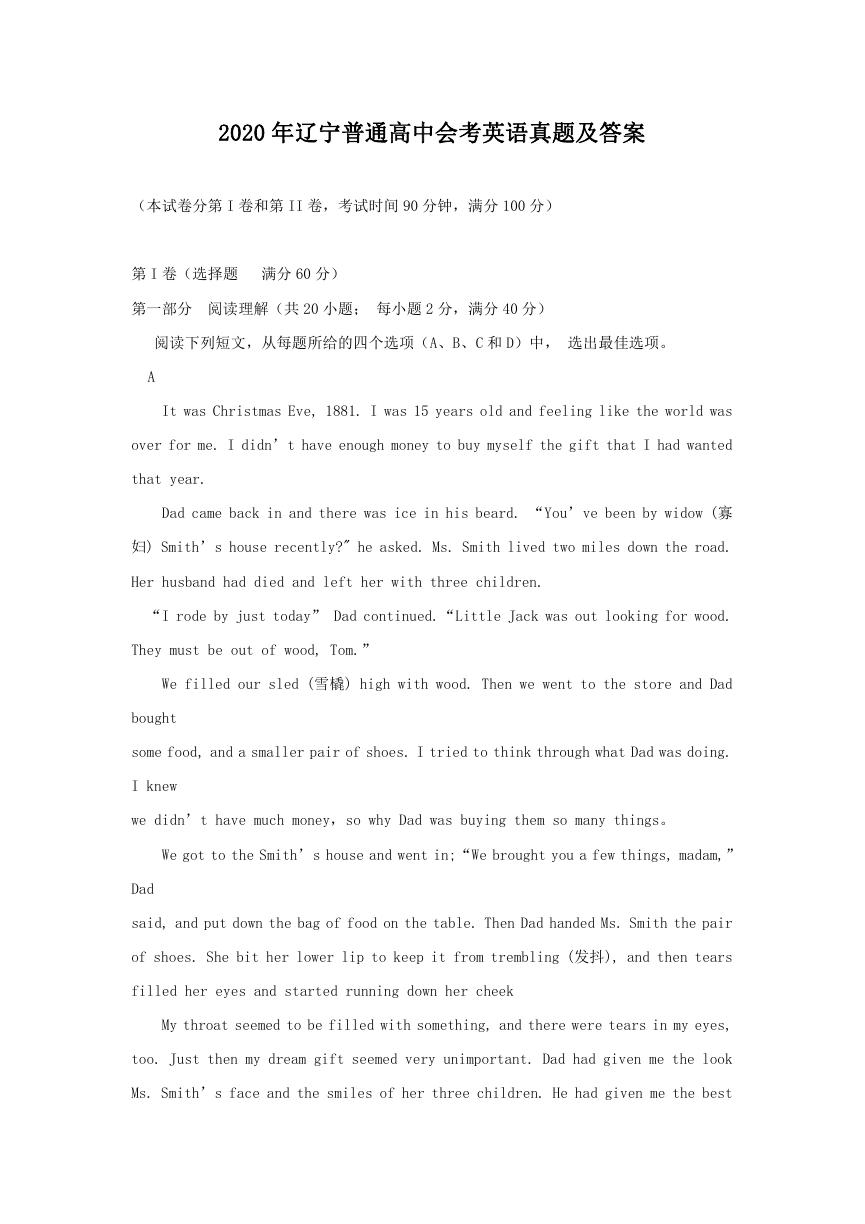
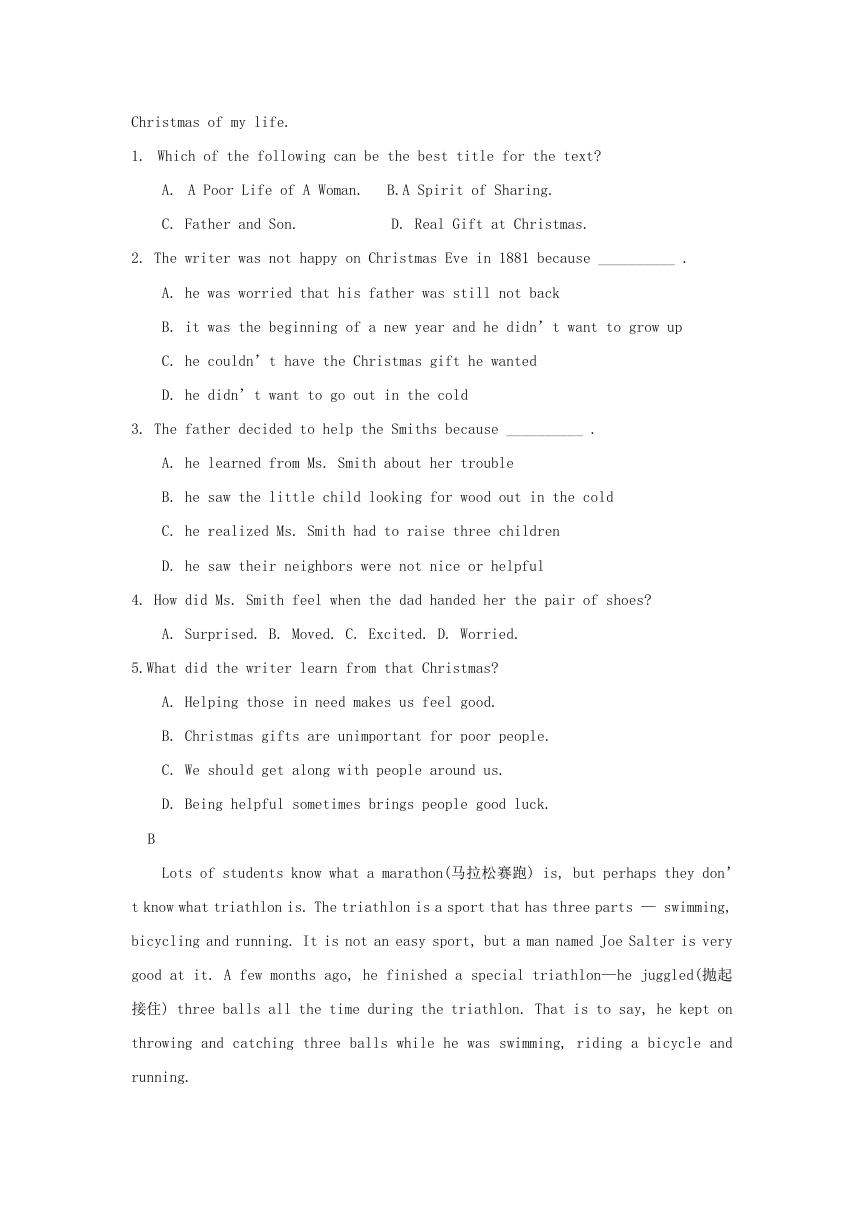
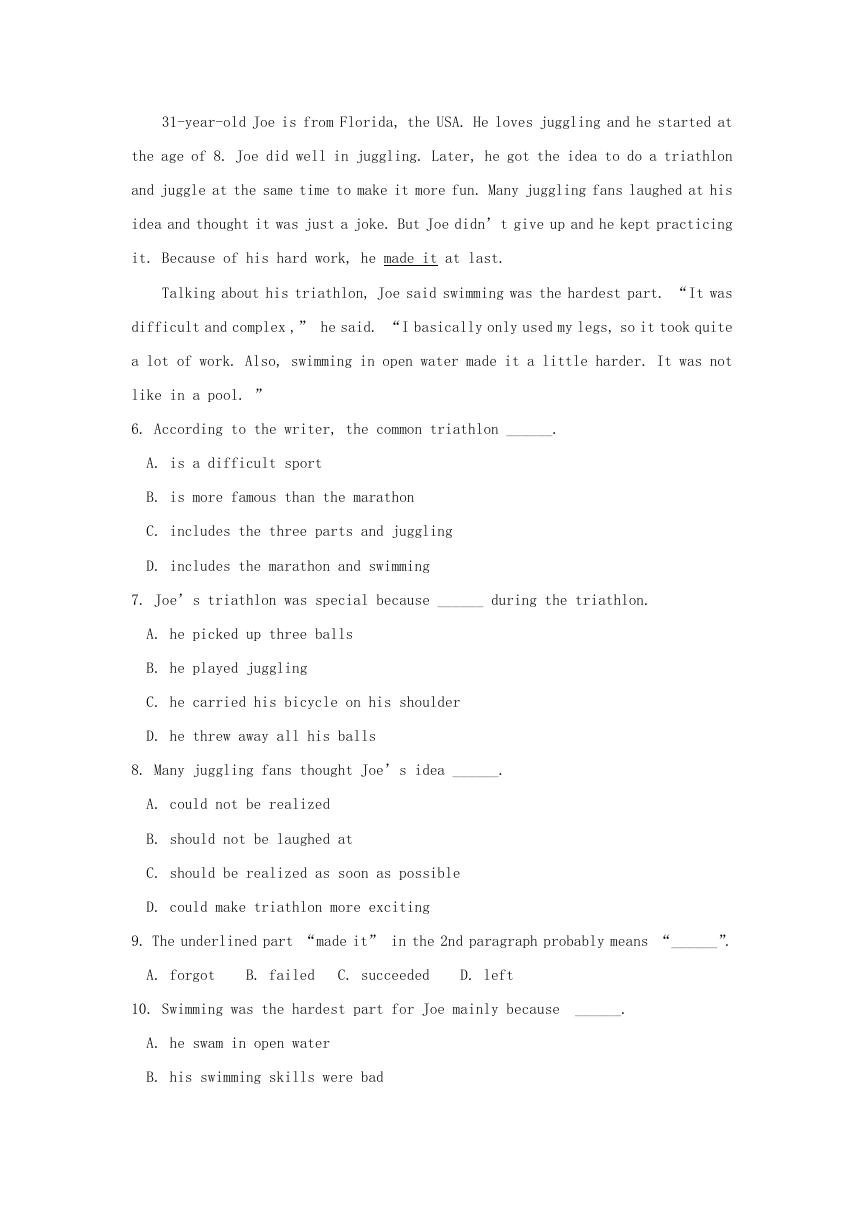
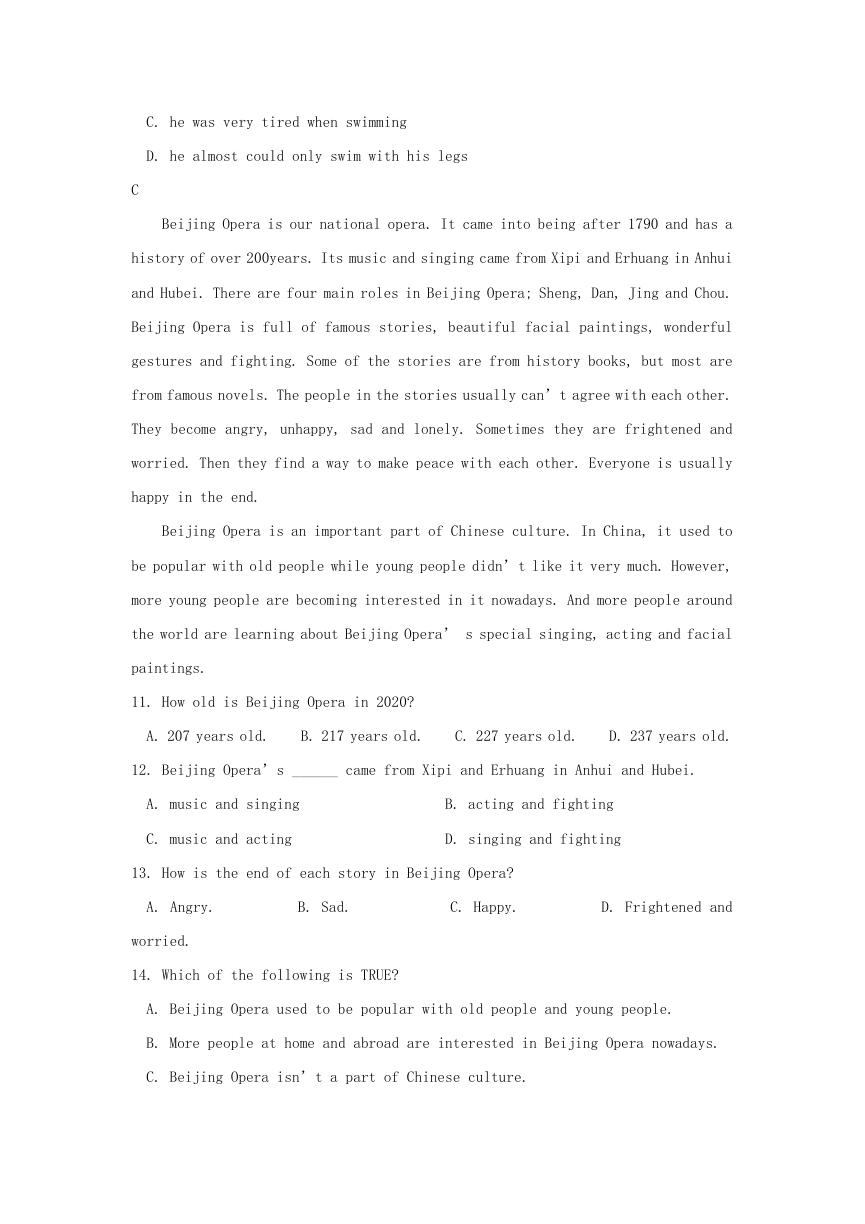
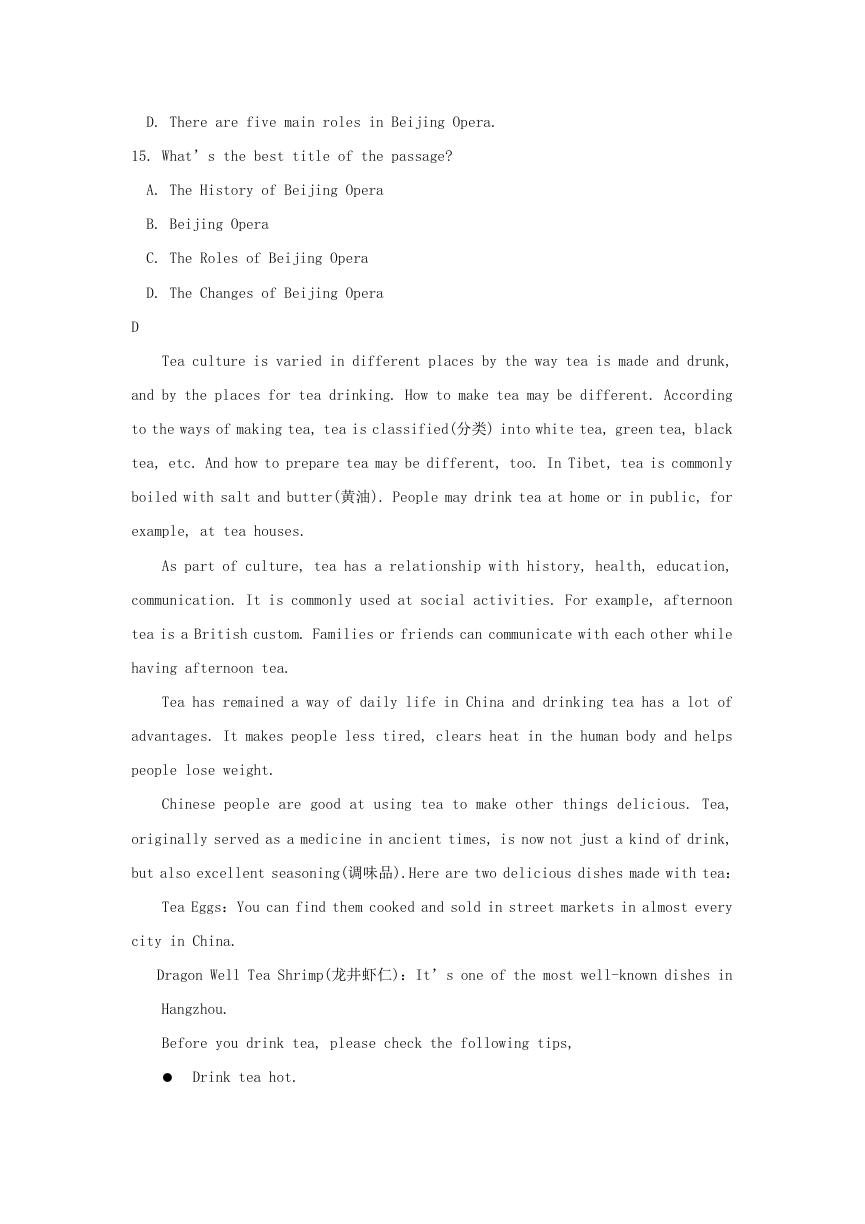
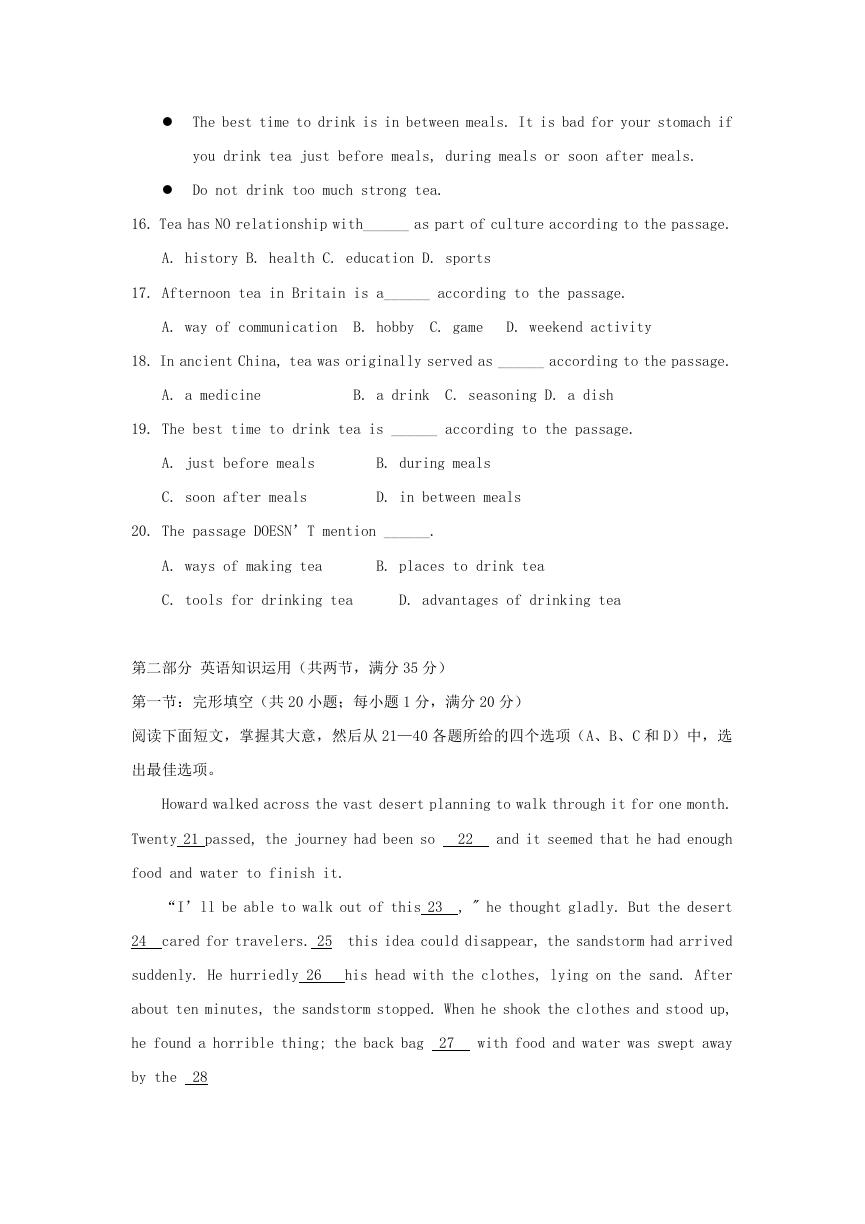
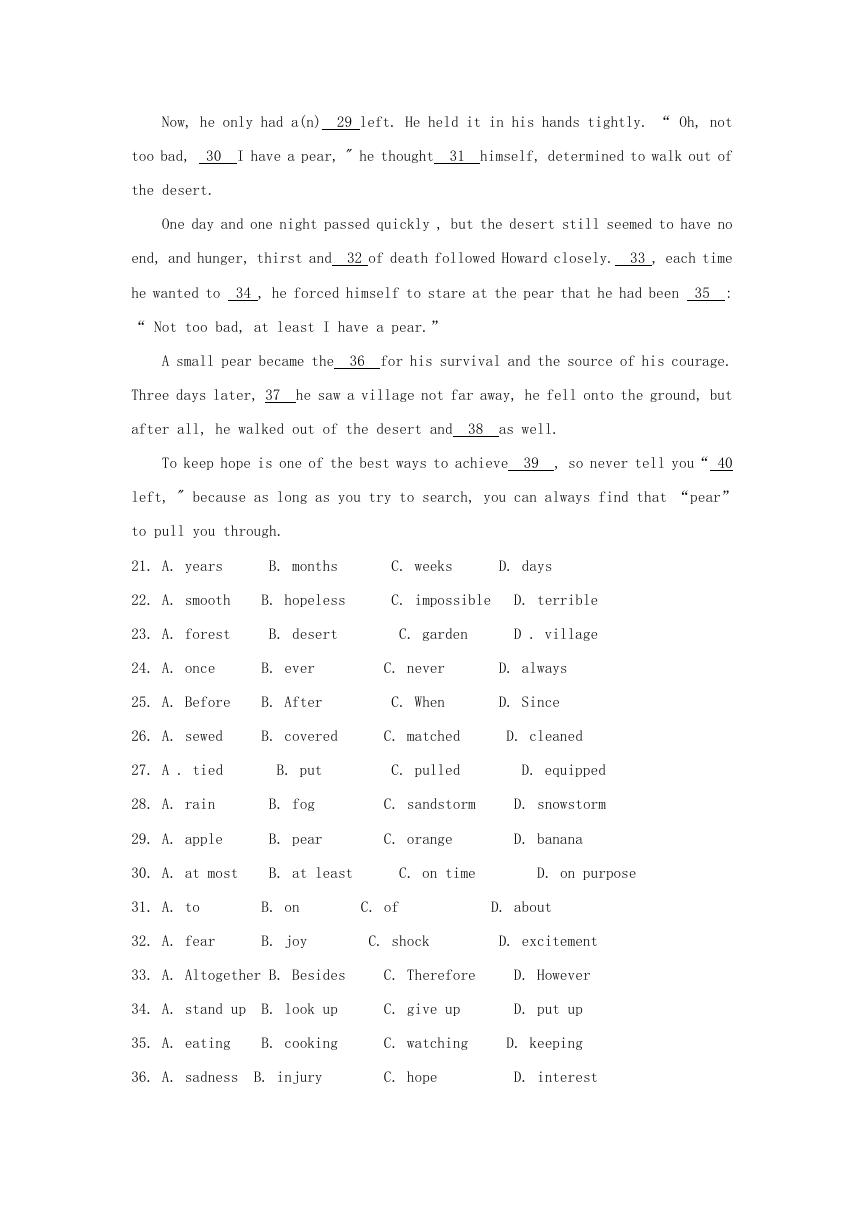









 2023年江西萍乡中考道德与法治真题及答案.doc
2023年江西萍乡中考道德与法治真题及答案.doc 2012年重庆南川中考生物真题及答案.doc
2012年重庆南川中考生物真题及答案.doc 2013年江西师范大学地理学综合及文艺理论基础考研真题.doc
2013年江西师范大学地理学综合及文艺理论基础考研真题.doc 2020年四川甘孜小升初语文真题及答案I卷.doc
2020年四川甘孜小升初语文真题及答案I卷.doc 2020年注册岩土工程师专业基础考试真题及答案.doc
2020年注册岩土工程师专业基础考试真题及答案.doc 2023-2024学年福建省厦门市九年级上学期数学月考试题及答案.doc
2023-2024学年福建省厦门市九年级上学期数学月考试题及答案.doc 2021-2022学年辽宁省沈阳市大东区九年级上学期语文期末试题及答案.doc
2021-2022学年辽宁省沈阳市大东区九年级上学期语文期末试题及答案.doc 2022-2023学年北京东城区初三第一学期物理期末试卷及答案.doc
2022-2023学年北京东城区初三第一学期物理期末试卷及答案.doc 2018上半年江西教师资格初中地理学科知识与教学能力真题及答案.doc
2018上半年江西教师资格初中地理学科知识与教学能力真题及答案.doc 2012年河北国家公务员申论考试真题及答案-省级.doc
2012年河北国家公务员申论考试真题及答案-省级.doc 2020-2021学年江苏省扬州市江都区邵樊片九年级上学期数学第一次质量检测试题及答案.doc
2020-2021学年江苏省扬州市江都区邵樊片九年级上学期数学第一次质量检测试题及答案.doc 2022下半年黑龙江教师资格证中学综合素质真题及答案.doc
2022下半年黑龙江教师资格证中学综合素质真题及答案.doc